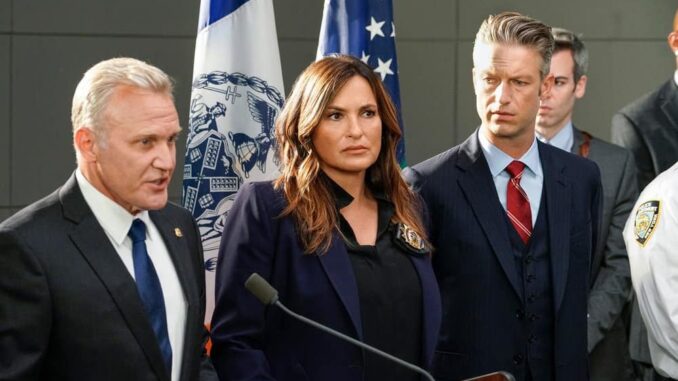
The Indelible Mark: When Mariska Hargitay Speaks of Olivia Benson
To discuss Mariska Hargitay’s portrayal of Captain, now Chief, Olivia Benson is to delve into more than just an actor’s performance; it’s an exploration of an enduring artistic alchemy, a quarter-century-long fusion of persona and purpose. When Hargitay speaks about Olivia Benson, particularly in the reflective interviews that punctuate her remarkable tenure on Law & Order: Special Victims Unit (such as those referenced by “md07” and countless others), she doesn’t merely recount lines learned or scenes shot. Instead, she unveils a profound, almost spiritual symbiosis, revealing how the character has not only defined her career but profoundly shaped her very being.
At the heart of Hargitay’s reflections is the sheer weight of longevity. “How do you separate yourself from someone you’ve literally spent more time with than anyone else in your life?” she’ll muse, a rhetorical question that echoes the sentiment of countless viewers who find it impossible to untangle the actor from the role. For over two decades, Benson has been Hargitay’s second skin, a shadow, a constant companion through personal milestones and global upheavals. This isn’t just a job; it’s an identity woven into the fabric of her existence. She often describes a blurring of lines, an inevitable bleed-through where Olivia’s unwavering resolve seeps into Mariska, and Mariska’s inherent compassion gives Olivia her undeniable warmth and humanity. It’s a testament to a commitment so deep it transcends the typical boundaries of acting.
Beyond the personal immersion, Hargitay invariably shifts to the colossal real-world impact of the character. Olivia Benson, for millions, is more than a fictional detective; she is a beacon, a symbol of justice, empathy, and resilience for survivors of sexual assault and domestic violence. Hargitay speaks with an almost reverential tone about the letters, the testimonials, the deeply personal stories shared by viewers who found the courage to speak their truth because of Olivia. “That’s why we do it,” she’ll state, her voice often thick with emotion, articulating the show’s mission as more profound than mere entertainment. This isn’t an abstract concept for her; it’s the genesis of her Joyful Heart Foundation, an organization dedicated to helping survivors heal. For Hargitay, Olivia Benson opened her eyes, then her heart, to a societal crisis, and in turn, gave her a platform for advocacy that far exceeds the soundstage.
The emotional toll of inhabiting such a role is another recurring theme in her discussions. Playing a character who daily confronts the darkest aspects of human nature – abuse, trauma, unspeakable cruelty – is not without its cost. Hargitay often speaks of the necessity of self-care, of “shaking it off” at the end of a grueling day, yet also acknowledges the indelible marks the stories leave. She describes the delicate balance of staying open and vulnerable enough to authentically portray the pain, without allowing it to consume her. Yet, even in discussing the inherent difficulty, there’s an undercurrent of gratitude. She sees Olivia’s journey through trauma and towards healing as a mirrored journey for herself and, crucially, for the audience. “Olivia teaches me every day,” she’ll affirm, about resilience, about never giving up, about the enduring power of hope.
Finally, Hargitay talks about the privilege of growing with a character. From a junior detective navigating a challenging beat to a seasoned captain leading a specialized unit, and now to a chief overseeing the entire squad, Olivia Benson’s evolution mirrors the arc of many real-life law enforcement careers. Hargitay relishes the opportunity to explore new facets of leadership, vulnerability, and strength as Olivia steps into bigger shoes. It’s a continuous learning process, a dynamic relationship where the actor brings her life experiences to the character, and the character, in turn, provides new perspectives for the actor. The consistent challenge, the constant demand to find new nuances in a character so familiar, is what keeps her tethered and inspired.
When Mariska Hargitay speaks about Olivia Benson, she isn’t just discussing a role; she’s articulating a life’s work, a mission, and an undeniable intertwining of identities. It’s a conversation that transcends the episodic nature of television, reaching into the very core of what it means to use art as a vehicle for change, empathy, and enduring human connection. Her words illuminate not just the character’s journey, but her own, underscoring the profound and indelible mark Olivia Benson has left on Mariska Hargitay, and through her, on the world.
